
Mariusz Kwiecien: the dashing opera hunk returns to Covent Garden
Polish baritone Mariusz Kwiecien, one of a new breed of 'barihunks', is set to get hearts fluttering as the reckless seducer Don Giovanni

Although tradition dictates that it’s tenors who set hearts fluttering – from José Carreras and Jonas Kaufmann to Mario Lanza and Alfie Boe – another erotic phenomenon in classical music has gone wild on the internet: the cult of “the barihunk”. Its pitch is that the more palpitating charm in opera emanates not from purveyors of high Cs but gym-buffed baritones with smouldering voices to match their six-pack abs.
For most of these pin-ups the calling card is Mozart’s nefarious womaniser Don Giovanni. The dashing Polish barihunk Mariusz Kwiecien, for example, has sung the role about 100 times over the last decade in 16 different productions. “My first one was in Tokyo, when I replaced Bryn Terfel – Seiji Ozawa conducting,” he tells me. “So that wasn’t a bad start.”
He returns to the challenge for Kasper Holten’s new production at Covent Garden, which he thinks audiences will find visually “very interesting” and strongly characterised. “Kasper listens to your ideas and take the ones he likes, but he is very precise about what he wants. I find that refreshing: it doesn’t happen often with directors.”
Together they will present Giovanni as a man of about 45, with greying hair, ebbing energy and a problem with depression. Kwiecien is intrigued by this approach.
“When I was 29, I played him as 29, full of energy, hope and life. I didn’t explore the darker side. Now I’m 41, I can feel his melancholy.”
“He has bad days, when he feels his age and he’s asking himself where it’s all going. His problem is that life and the world have become too small for him. He finds himself in a corner, where nothing inspires him. He’s tried all sorts of women, maybe men too, travel, food and drink. But the only thing he hasn’t experimented with is death, so the whole thing with the Commendatore is a big excitement for him: he wants to look into the abyss.”
Kwiecien seems a rather sunnier sort of a chap than the one he has had such global success playing on stage. A native of Krakow, he came from an unmusical background and spent his early teenage years listening to the likes of Bon Jovi, “who can still bring tears to my eyes”.
Opera didn’t come to him in a Damascene moment, but he explains that once he’d set his heart on it, he was totally focused. “I’m a Scorpio, you see.” His early career progressed steadily through the conventional route of choirs, conservatoire and competition prizes, with debuts at La Scala and the Vienna Staatsoper made before he won a place on the Metropolitan Opera’s Young Artists’ programme in 1999.

The Polish Baritone Mariusz Kwiecien (Photo: MIKOLAJ MIKOLAJCZYK)
Since then he’s sung every season at the Met – most recently as Eugene Onegin opposite Anna Netrebko – and become a great New York favourite. America is now his professional home (“I pay my taxes there and have an apartment five minutes from the Met”), but his “heart home” is still in Krakow, where he has a house and keeps a number of swish, gas-guzzling cars.
Life has been good to him, he says. “I never expected any of this. When I was a student, I dreamt of singing perhaps just once at La Scala or Covent Garden.” Recently he has had a minor setback related to back surgery – the result, he says, of “too much jumping up and down and maybe some crazy behaviour on the beach” – but now he’s firing on all cylinders and enjoying a return to Covent Garden, a place he likes enormously. “And I am not just saying that to sound nice for this interview. It’s one of the friendliest opera houses, where everyone works together.”
Next season he returns here for the title role in Szymanowski’s extraordinary opera King Roger, a Polish masterpiece that he loves for “the big questions it asks as well as its exquisite music”. Further ahead, he does not seem hugely ambitious – in fact, a few years ago he contemplated packing it all in and trying something else. “The life of an opera singer isn’t easy or well balanced. It’s just that I’m not sure what the alternatives would be for me.”
Last year at Covent Garden, he sang a very fine Posa in Don Carlo, and there are three further Verdian pinnacles he would like to climb: the title roles of Macbeth and Simon Boccanegra and Iago in Otello. “Rigoletto or Il Trovatore don’t interest me, though everybody seems to think they should. And I’m not interested in recording studios or opera as just something to listen to either. I like it live, in the theatre, because I can give more and get more out of it.”
Don Giovanni opens at the Royal Opera House, WC2 (020 7304 4000) on February 1